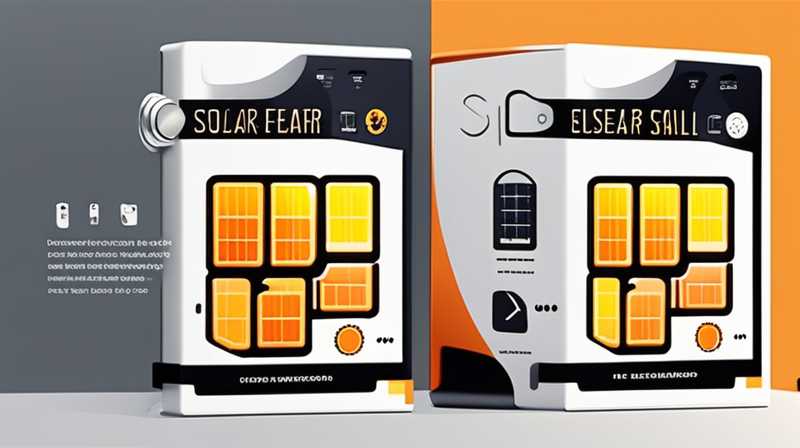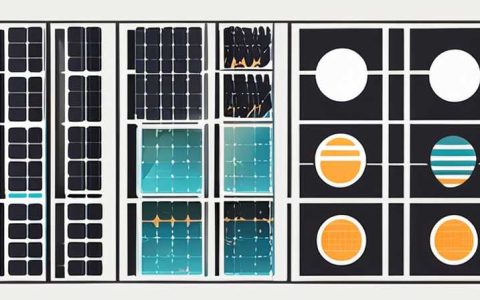
1. The leading brands in solar energy sales include LG, SunPower, and Canadian Solar. Each of these manufacturers has established a strong market presence globally. 2. Factors influencing their sales include product efficiency, warranty offerings, and consumer trust. 3. LG is renowned for its high-efficiency solar panels, which make them a preferred choice. 4. SunPower excels in providing robust warranties and reliable performance. 5. Canadian Solar offers competitive pricing and good performance, appealing to various markets. In detail, the performance and reputation of these companies have a significant influence on consumer decisions, contributing to their standing as top brands in solar energy sales.
1. MARKET DYNAMICS IN SOLAR ENERGY SALES
The landscape of the solar energy industry has undergone significant transformation over the past decade. With increasing demand for renewable energy sources, various solar panel manufacturers compete for market share. The sale of solar energy solutions is influenced by technological advancements, government incentives, and consumer awareness. Companies must navigate these dynamics to achieve success in a rapidly evolving environment.
Understanding market trends aids in identifying which brands dominate in solar energy sales. The popularity of solar energy systems stems from the urgency of addressing climate concerns, fluctuations in energy prices, and a collective move toward sustainable energy solutions. As a result, consumers are more proactive in selecting energy providers, significantly influencing sales figures. Notably, leading brands invest heavily in research and development to improve their offerings, which strengthens their positions in the marketplace.
2. LEADING SOLAR ENERGY BRANDS AND THEIR STRENGTHS
Several brands have stumbled upon successful tactics to establish themselves in the solar energy market. Among these, LG, SunPower, and Canadian Solar stand out for their remarkable achievements.
LG: A PIONEER IN TECHNOLOGY AND EFFICIENCY
LG Electronics has made a name for itself by providing premium solar energy solutions. Their panels, celebrated for exceptional efficiency ratings and performance, set industry benchmarks. Central to LG’s strategy is constant innovation. The company invests substantially in research to enhance energy conversion rates. For instance, LG’s Neon R series boasts an impressive efficiency rating that can exceed 22%, making them highly desirable among homeowners and businesses seeking to optimize energy production.
The firm has not limited its focus to product performance alone; LG also cultivates a strong brand reputation. The combination of high-quality products and robust company values instills consumer confidence. Potential buyers often consider brand reliability before making significant investments, reinforcing LG’s position as a trusted manufacturer in solar energy sales.
SUNPOWER: RELIABILITY AND WARRANTIES
SunPower distinguishes itself with a reputation for high reliability and superior warranty offerings. Their comprehensive warranty extends to 25 years for both product and performance, outlasting many competitors. This longevity assures consumers that they are making a sound investment with a minimized risk of failure.
Performance guarantees are crucial in consumer decision-making. SunPower’s innovative Maxeon technology stands out due to its unique cell design, which enhances durability and performance under real-world operating conditions. This proprietary technology leads to lower degradation rates and higher energy production over the lifespan of the solar panels. As a result, SunPower captures a considerable share of the market by appealing to environmentally conscious consumers who value long-term performance assurance.
CANADIAN SOLAR: AFFORDABILITY AND MARKET REACH
Canadian Solar has carved a niche for itself as an affordable option without sacrificing quality. Their competitive pricing appeals to various demographics, from residential clients to large-scale utility projects. In an industry where pricing can often be a barrier, Canadian Solar successfully penetrates diverse markets.
Their strategy also includes a global outreach program that emphasizes collaboration with local distributors. This model enables the company to tap into regional markets effectively, allowing for tailored solutions that meet specific consumer needs. Additionally, Canadian Solar’s commitment to sustainability resonates strongly with an environmentally conscious consumer base, further enhancing its appeal.
3. ECONOMIC AND ENVIRONMENTAL FACTORS DRIVING SOLAR ENERGY SALES
The growth of solar energy is not solely attributed to technological advancements or competitive pricing. Economic and environmental factors play a significant role in shaping the industry’s trajectory. Governments worldwide are increasingly incentivizing renewable energy adoption through subsidies, tax rebates, and legislative support.
Policy frameworks designed to combat climate change spur demand for solar installations. Various federal and state initiatives encourage homeowners and businesses to transition from fossil fuels to renewable energy sources. As a result, this increasing regulatory support significantly bolsters the overall market for solar energy solutions.
Moreover, the falling costs of solar panel production have led to more accessible pricing for consumers. Advancements in manufacturing processes and supply chain optimization have contributed to these price drops, enabling more people to invest in solar systems. This affordability creates a larger customer base, further propelling sales advantages for prominent brands in the sector.
4. CONSUMER TRENDS AND PREFERENCES IN SOLAR ENERGY ADOPTION
Understanding consumer preferences is essential for solar brands looking to enhance their sales performance. Modern consumers are increasingly concerned with sustainability and environmental impact, driving home the need for green energy solutions. As a result, their decisions are influenced by not only efficiency and price but also by the brand’s ecological footprint.
Consumer awareness regarding the benefits of solar energy is rapidly growing. Many individuals are now inclined to educate themselves about solar technology before making decisions. This heightened awareness leads consumers to favor brands with reputable histories in sustainability and responsible practices. Consequently, brands that engage effectively with their customers through transparent communication and sustainable initiatives distinguish themselves in a saturated market.
Moreover, the integration of smart technology into solar systems is gaining traction. Homeowners prefer systems that offer accessibility through mobile applications, enabling real-time monitoring and management. Brands that adopt smart solutions find additional traction among tech-savvy consumers, thereby expanding their market reach.
5. THE FUTURE OF SOLAR ENERGY SALES
The solar energy industry appears poised for remarkable growth, exhibiting strong indicators of expanding market demand. Significantly, the transition to renewable energy sources is a major trend that aligns with global efforts to combat climate change. As energy prices fluctuate and sustainability becomes paramount, consumers increasingly gravitate toward solar solutions.
Emerging technologies such as energy storage systems are further enhancing the appeal of solar energy. Innovations like battery storage allow consumers to harness excess energy generated during the day for use after sunset. This capability not only optimizes energy consumption but also strengthens overall consumer satisfaction, resulting in improved sales figures for establishments that incorporate these features.
The demand for solar energy solutions will likely benefit from strategic partnerships between manufacturers and installation companies. Companies that foster these alliances can create streamlined processes for consumers, effectively addressing installation and service concerns. Such strategic moves can capitalize on consumer confidence, further empowering brands in their pursuit of effective sales strategies.
FREQUENTLY ASKED QUESTIONS
WHAT FACTORS SHOULD BE CONSIDERED WHEN CHOOSING A SOLAR ENERGY BRAND?
Selecting the ideal solar energy brand hinges on several pivotal factors. Performance metrics, such as efficiency ratings, overall durability, and energy output are key determinants. Prospective consumers should investigate warranties and service options offered by manufacturers, as extensive coverage suggests a commitment to quality and reliability. Furthermore, customer reviews and ratings can provide insightful perspectives on performance over time, indicating the true value of solar panels in real-world scenarios.
Another essential aspect of consideration is affordability, as solar energy systems often represent a substantial investment. Comparing financing options and available incentives in your area can yield significant savings and boost budget feasibility. The credibility and track record of a brand can also influence trust levels—those with a history of ethical practices and sustainability may resonate more with environmentally conscious consumers.
HOW DO SOLAR PANEL EFFICIENCY RATINGS AFFECT COSTS AND ENERGY YIELDS?
Efficiency ratings are pivotal in determining how effectively a solar panel converts sunlight into usable electricity. Solar panels with higher efficiency ratings typically yield more energy over the same area compared to their lower-rated counterparts. This translates to potentially reduced installation costs, as fewer panels may be required to achieve desired energy production levels, thereby saving significant space.
Higher efficiency also enhances energy yield, making performance a critical component when evaluating cost-effectiveness in any given system. As homeowners and businesses aim to maximize their return on investment by minimizing energy costs, they tend to gravitate towards high-efficiency panels upfront, even if the initial cost is higher. Ultimately, an informed decision hinges on understanding individual or organizational energy consumption needs and aligning with the most suitable efficiency level.
WHAT ARE THE ENVIRONMENTAL IMPACTS OF SOLAR ENERGY ADOPTION?
Implementing solar energy can yield substantial environmental benefits. By harnessing the sun’s natural power, components of the solar system contribute to reduced greenhouse gas emissions. This shift directly addresses climate change concerns, facilitating the transition from finite fossil fuel sources to sustainable alternatives. Furthermore, solar energy can mitigate reliance on non-renewable energy sources, fostering energy independence and sustainability.
Moreover, solar installations inherently reduce air pollution, contributing to improved public health conditions. The localized generation of clean energy decreases the demand for coal and gas plants, leading to less toxic output into the environment. While the manufacturing of solar panels entails environmental considerations, many manufacturers now employ sustainable practices to minimize waste and recycling challenges. The overall net positive impact far outweighs the negatives, fostering a cleaner, healthier planet.
THE SIGNIFICANCE OF SOLAR ENERGY’S ROLE IN THE GLOBAL ENERGY TRANSITION
The shift toward solar energy adoption is emblematic of a broader transition within global society, one that emphasizes sustainability and renewable resources. As climate change poses significant risks to our environment and livelihoods, embracing solar power represents a proactive step toward mitigating those effects. Major economies are rethinking energy policies, placing a premium on low-carbon technologies.
Decision-makers globally are beginning to recognize and promote solar energy’s role at the forefront of the energy transition. Solar power not only contributes to lower carbon emissions but also facilitates energy security for nations as they become less reliant on imported fossil fuels. As various sectors increasingly pivot toward solar technologies, doing so serves as a rallying call for future generations to embrace renewable sources, thus solidifying solar energy as a meaningful component of an equitable, sustainable, and resilient future.
Sustainability goals intersect with economic opportunities, as investments in solar initiatives create new jobs and drive innovation. Active participation from the private sector ushers in public-private partnerships that fuel rapid advancements in solar technology. Through innovative financing options and supportive policies, stakeholders create an ecosystem poised for significant expansion.
By embracing the solar energy revolution, society can save not only on utility bills but also foster environmental stewardship, steering us toward a more sustainable and healthier world. The direction is clear: solar power is more than just a trend; it’s an essential component of the energy strategy for generations to follow.
Original article by NenPower, If reposted, please credit the source: https://nenpower.com/blog/what-brand-of-solar-energy-sells-best/











